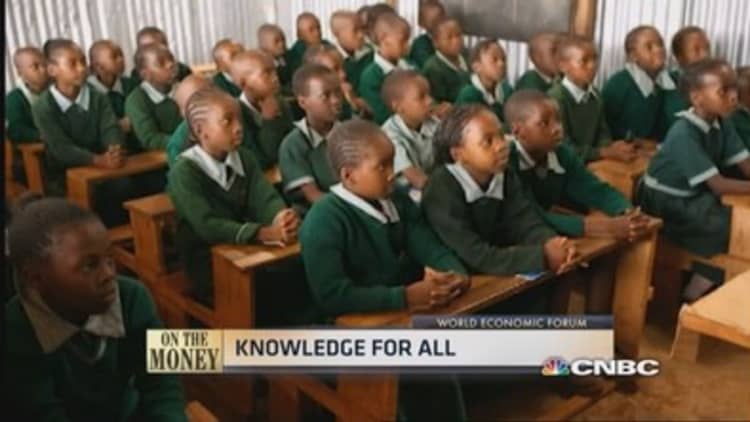
With many children around the world beset by poverty and poor educational prospects, Bridge International Academies is looking to export the innovative charter school model to international markets.
Using a school-in-a-box franchise model, the Kenya-based organization gives children a quality education for roughly $5 a month, beginning with early childhood development classes through 8th grade.
"Families are spending 15 percent of their income on schools because they know education is the key to getting out of poverty," said Jay Kimmelman in an interview with CNBC's "On the Money." The first Bridge International Academy opened in 2009.
Along with his wife, Dr. May Shannon, Kimmelman is the co-founder of Bridge International. The school operator counts a host of big names among its investors, including Bill Gates and Pierre Omidyar.
The charter school franchise is giving children the chance to have a solid education, regardless of their family's income. As a result of their work and success as the largest chain of private schools in Africa, The World Economic Forum named May and Kimmelman Social Entrepreneurs of the Year.
Read MoreThis is the biggest sin in America: Dimon
According to figures from The World Bank, one billion people will live in extreme poverty in 2015, while 2.2 billion people live on less than $2 a day. Average poverty rates in developing countries have slightly declined over the years, yet the number of people living in extreme poverty remains very high.
For many who live in developing economies, this means that access to good schools remains elusive, as the effects of poor education limits employment opportunities and increases inequality for women. Bridge International seeks to remedy this problem with a low-cost educational model.
Marrying technology and education
Kimmelman was founder and CEO of Edusoft, the leading educational software company providing assessment platforms to U.S. public schools. In 2004, he sold the 150-person, $20 million company to Houghton Mifflin. At that time, Edusoft was serving more than 3 million students in 400 school districts across the nation.
He says that experience helped inform his philosophy with Bridge International.
"What we've done is taken a systems approach and looking at all the parts of the educational process and say, 'What parts do you need to deliver world-class quality education, but at a price point that a customer is getting an experience that you'd get at any great school anywhere in the world?' " Kimmelman said.
Technology makes a huge difference in learning at Bridge International schools, which are predominantly located in rural areas. Using smartphones and tablets, curricula and administrative tasks are automated and streamlined for efficiency and tailored for the rigors of knowledge work. The students aren't the only ones that get vetted, however.
"With an attendance system, we are able to see when our teachers arrive for positive reinforcement, and disciplinary procedures to ensure that our teachers are always teaching," says Shannon. "A child who is 3 to 8 years old needs an adult in the classroom to learn how to read."
Read MoreUPenn leader backs call for affordable education ahead of Obama plan
Prior to cofounding Bridge, Shannon served as an advisor to many international organizations, focusing on design, development and sustainable cities around the world. Her experience also extends to the classroom, having taught in primary, middle and secondary schools in China and the U.S.
More than 100,000 students are enrolled at nearly 350 Bridge schools, all in Kenya. They are staffed with approximately 4,500 teachers who leverage technology and use digital devices to deliver class lessons created by education specialists. Student evaluations are electronically tracked and monitored by school administrators.
Kimmelman and Shannon hope to export that model to schools in India, Uganda and Nigeria this year.
"As long as you can keep the price point affordable, families can now send all their girls and all their boys to school unassisted," Kimmelman said.
"On the Money" airs on CNBC Sundays at 7:30 pm, or check listings for air times in local markets.




